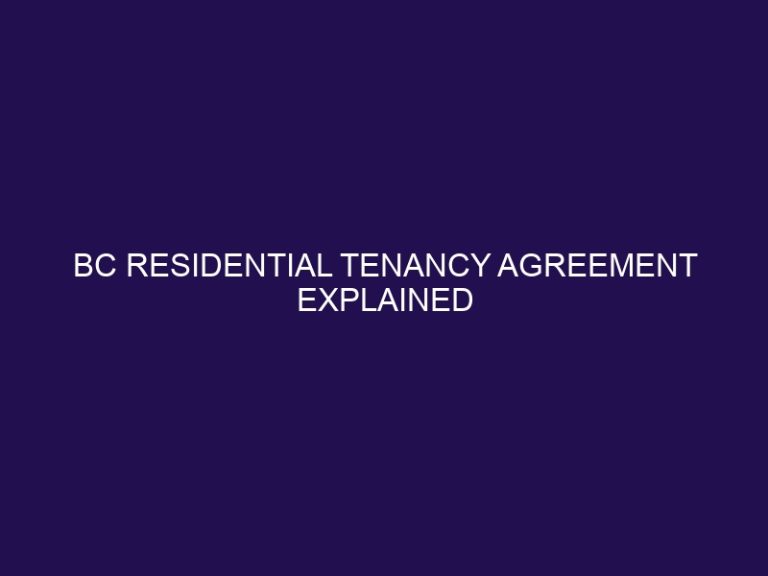The Pros and Cons of Renters With Pets
Introduction to Renters With Pets
Renting with pets has become increasingly popular in recent years, with statistics showing that over 60% of American households own a pet. However, finding a rental property that allows pets can be a challenge for pet owners. Landlords may have concerns about potential property damage, disturbances to neighbors, and liability for pet-related incidents. On the other hand, renters with pets enjoy the benefits of companionship, improved mental and physical health, and potential savings on pet care costs. Let’s take a closer look at the pros and cons of being a renter with pets.
The Pros of Renters With Pets
- Increased Happiness and Companionship: Pets bring joy and comfort to our lives, making us feel happier and less lonely. They also provide companionship, especially for those living alone, and can alleviate symptoms of depression and anxiety.
- Improved Mental and Physical Health: Studies have shown that owning a pet can improve mental and physical health. They can reduce stress, lower blood pressure, and encourage physical activity.
- Higher Rental Demand and Longer Tenancy: With a limited number of pet-friendly rentals available, landlords who allow pets may attract a higher demand for their property. Additionally, tenants with pets tend to stay in a rental longer, reducing vacancy rates and turnover costs for landlords.
- Potential Savings on Pet Care Costs: Pet owners who rent may save on pet care costs such as pet insurance, grooming, and daycare by living in a rental property that includes these services in their rent.
The Cons of Renters With Pets
- Potential Property Damage: Pets can cause damage to a rental property, such as chewing on furniture or scratching floors and walls. This can result in additional expenses for landlords and may lead to disputes.
- Noise and Disturbance to Neighbors: Barking, meowing, and other pet noises can be a nuisance to neighbors, leading to complaints and potential conflicts.
- Liability for Pet-Related Incidents: Landlords may be liable for pet-related incidents, such as bites or injuries caused by the tenant’s pet. This can result in legal and financial consequences for the landlord.
- Limited Rental Options and Higher Fees: Tenants with pets may have limited rental options, and those that accept pets may charge higher fees or deposits to cover potential damages.
How to Find Pet-Friendly Rentals
Searching for a pet-friendly rental may require more time and effort, but it is not impossible. Use online resources, such as rental websites or social media groups, to find pet-friendly properties. You can also inform your network of friends and family about your search, as they may know of a suitable rental property. Additionally, consider working with a real estate agent who specializes in pet-friendly rentals.
Tips for Renters With Pets
- Be Honest and Responsible: Be honest with your landlord about your pet and its behaviors. Take responsibility for any damages caused by your pet and ensure they are well-behaved.
- Get Pet Insurance: Consider getting pet insurance to cover any potential damages or liability issues.
- Communicate with Your Landlord: Stay in touch with your landlord and inform them of any changes or issues related to your pet.
- Follow the Rules and Regulations: Adhere to any rules and regulations set by your landlord, such as leash laws or pet waste disposal policies.
In conclusion, being a renter with pets has its pros and cons. However, with responsible pet ownership and good communication with your landlord, it is possible to find and maintain a pet-friendly rental property.
Key Takeaways:
The Pros of Renters With Pets
Having a furry companion can bring immense joy and comfort to our lives, but for renters, owning a pet may come with its own set of challenges. However, the benefits of having a pet are undeniable, and this is especially true for renters. In this section, we will discuss the pros of renters with pets, including the positive impact on happiness and companionship, mental and physical health, rental demand and tenancy, and potential savings on pet care expenses.
1. Increased Happiness and Companionship
- Adopt a pet that suits your lifestyle and preferences for increased happiness and companionship.
- Invest time in training and socializing your pet to cultivate a harmonious bond.
- Make sure to allocate dedicated playtime and affection to nurture the relationship between you and your pet.
Pro-tip: Regular exercise and mental stimulation are crucial for the well-being of your pet and your own happiness.
2. Improved Mental and Physical Health
- Regular exercise with pets fosters improved physical and mental health.
- Reduced stress and anxiety through pet companionship.
- Lower blood pressure and improved cardiovascular health.
- Enhanced mood and mental well-being from pet interaction.
Ancient Egyptians revered cats, considering them as sacred animals, and believed that cats brought good luck to the households where they lived.
3. Higher Rental Demand and Longer Tenancy
- Attract more tenants and encourage longer stays by catering to pet owners and allowing pets on the property.
- Create a loyal and stable tenant base by providing pet-friendly amenities and implementing policies for responsible pet ownership.
- Mitigate potential risks and provide financial protection for landlords by requiring pet deposits and insurance.
By considering renters with pets and implementing pet-friendly policies, landlords can experience higher rental demand and longer tenancy, resulting in a positive and long-lasting landlord-tenant relationship.
4. Potential Savings on Pet Care Costs
- Regular preventive care can lead to potential savings on long-term medical expenses.
- When purchasing pet supplies and medications, it is beneficial to comparison shop for potential discounts.
- Consider self-grooming your pet to save on grooming costs.
- By training your pet to perform basic care tasks, such as teeth brushing, you can avoid professional fees.
Pro-tip: Prioritize preventive care to avoid costly treatment later.
The Cons of Renters With Pets
While having a furry companion can bring joy and companionship, it can also present challenges for renters. In this section, we will discuss the cons of renting with pets and the potential downsides that pet owners may face. From potential property damage to limited rental options, we will delve into the key factors that landlords and property managers may consider when renting to pet owners. By understanding these potential drawbacks, renters with pets can make informed decisions when searching for their next home.
1. Potential Property Damage
- Regular home inspections to prevent potential property damage
- Use of pet-friendly products to protect against potential property damage
- Training and behavioral management to reduce the risk of potential property damage
- Prompt repair and maintenance to address any potential property damage
2. Noise and Disturbance to Neighbors
- Respect Quiet Hours: Ensure pets are not causing noise and disturbance during designated quiet hours.
- Train Pets: Conduct obedience training to minimize excessive barking or disruptive behavior that could disturb neighbors.
- Notify Neighbors: Inform neighbors about your pet and address any concerns promptly to prevent any noise or disturbance issues.
- Soundproofing: Implement measures like rugs or wall insulation to minimize noise transmission and prevent disturbance to neighbors.
3. Liability for Pet-Related Incidents
- Be aware of your legal responsibility for any incidents involving your pet, including potential damage or injury.
- Understand the potential financial and legal consequences of pet-related incidents and ensure that you have appropriate insurance coverage.
- Take proactive measures to minimize the risk of pet-related incidents, such as training your pet and pet-proofing your rental space.
A friend’s dog accidentally knocked over a valuable vase in a rental home, sparking a conversation with the landlord about liability and the importance of having pet insurance.
4. Limited Rental Options and Higher Fees
Pet owners may face challenges when searching for rental options due to limited availability and higher fees. Some landlords may have restrictions on pet-friendly rentals, resulting in a narrower selection. Additionally, pet deposits or increased rent for pet owners are common, making it more difficult to find affordable and suitable accommodation.
How to Find Pet-Friendly Rentals
- Search Online: Utilize websites such as Zillow or Apartments.com and use filters to find pet-friendly rental options.
- Local Resources: Check community bulletin boards or local newspapers for listings that are open to pets.
- Connect with Realtors: Reach out to real estate agents who specialize in rental properties and inquire about pet-friendly options.
When searching for pet-friendly rentals, it’s important to be proactive, patient, and upfront about your pet’s size and behavior to secure the perfect living space for both you and your beloved pet.
Tips for Renters With Pets
Are you a renter with a furry companion? While having a pet can bring joy and companionship, it can also present challenges when it comes to finding a rental property. In this section, we will discuss some helpful tips for renters with pets to ensure a smooth and successful rental experience. From being honest and responsible to following rules and regulations, we will cover all the important aspects that can make renting with pets a positive and hassle-free experience.
1. Be Honest and Responsible
- Disclose Pet Information: Provide accurate details about your pet to the landlord.
- Maintain Cleanliness: Keep the rental unit and common areas clean.
- Train Your Pet: Ensure your pet is well-behaved and follows the rules.
- Respect Property: Prevent any damage caused by your pet.
Did you know that being honest and responsible as a pet owner can help foster positive relationships with landlords and neighbors?
2. Get Pet Insurance
- Research various pet insurance providers to discover the ideal coverage for your furry friend’s requirements.
- Compare different plans, taking into account factors such as premiums, deductibles, coverage limits, and reimbursement percentages.
- Thoroughly read the policy, understanding any exclusions, waiting periods, and claim procedures.
- Discuss the selected policy with your landlord to ensure it complies with any rental agreements.
3. Communicate with Your Landlord
- Communicate with your landlord honestly and transparently about your pet.
- Be sure to provide any necessary documentation, including pet insurance and vaccination records.
- Discuss any concerns or rules regarding pets in the rental property with your landlord.
- Agree to follow any pet-related terms outlined in the lease agreement.
4. Follow the Rules and Regulations
- Review Lease: Familiarize yourself with the pet policies outlined in the lease agreement.
- Seek Approval: Obtain written permission from the landlord before bringing in a pet.
- Comply with Regulations: Adhere to pet-related rules and regulations, including leash laws, waste disposal, and noise restrictions.
- Maintain Records: Keep records of vaccinations, licenses, and any required documentation.
Frequently Asked Questions
Should I allow pets in my rental property?
It ultimately depends on your personal preference and individual circumstances. Allowing pets can bring benefits such as attracting a larger tenant pool and maximizing rental income, but it also comes with added responsibilities and potential risks. Consider consulting with a property management service or legal counsel for helpful information on creating a pet policy.
Can pet owners make good long-term tenants?
In many cases, yes. Pet owners tend to be more responsible and have higher incomes, making them ideal tenants who can take good care of your property. However, it’s important to have screening procedures in place to ensure you find the right tenants for your rental business.
Will allowing pets increase my rental income?
Yes, it’s possible to charge higher rent for pet-friendly properties due to limited availability in the market. You can also consider implementing a pet fee or pet rent to maximize your rental income.
How can I minimize the potential damage from pets?
Some landlords choose to have specific requirements for pets, such as weight limits or breed restrictions, or charge a pet deposit or pet insurance. You can also have a thorough inspection and cleaning process in place between tenants.
Is it legal to charge a pet fee or pet rent?
It’s important to check with your state and local laws, as well as consult with legal counsel, to ensure that any fees or rent charges related to pets are compliant with applicable laws.
How can allowing pets potentially reduce stress and tenant turnover?
By providing a pet-friendly building, you may attract a younger market of millennial renters who are more likely to have pets. This can result in longer tenures and lower tenant turnovers, reducing the stress of constantly searching for new tenants and maximizing the market value of your property.







